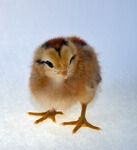
Corporate Headquarters
P.O. Box 266
1833 Park Lane
Burlington, WA 98233
Office: (360) 757-6053 / Fax: (360) 757-4143

 It’s the time of year when those cute and fuzzy chicks start showing up at your Country Store. Although they are irresistibly cute, it is important to remember that chicks require special care to get them from fuzzy pets to healthy, happy egg-layers. If you are considering raising chicks this year, read on for tips that will help you succeed.
It’s the time of year when those cute and fuzzy chicks start showing up at your Country Store. Although they are irresistibly cute, it is important to remember that chicks require special care to get them from fuzzy pets to healthy, happy egg-layers. If you are considering raising chicks this year, read on for tips that will help you succeed.
Before you bring your chicks home you will need to set up an area for them to live. A brooding area can be anything from a large box with a screen cover to a wood house or a full building. By ten weeks your chicks will require about one square foot of space each, so plan accordingly for the size of flock you intend to raise. Be sure the brooder is located in a safe place that is free from drafts.
One or more brooder lamps will be required to keep the chicks warm during their first few months of life. Ideal temperature for the first week of life is 95 to 100 degrees, with temperature decreasing five degrees each week thereafter. When the temperature reaches 70 degrees the lamp can usually be removed. It is a good idea to observe your chicks to see if they are crowding the lamp or avoiding it. This will give you a clue as to how to better adjust the heat to suit them.
Spread newspaper topped with at least two to three inches of organic flooring material across the bottom of the brooder. Pine shavings and corncob bedding are popular choices. This material should be changed daily. Simply roll the paper and soiled material up together and lay new material.
Chick starter feed and water should be made accessible to the chicks at all times. When the chicks reach eight to ten weeks you can change the starter feed to a grower feed. Keep water containers small or use a fountain to prevent spills and wet chicks. Water and food needs will change as the chicks grow, so be prepared with larger containers.
Once the chicks start to show feathers they can be placed outside in a wire pen during warm days, for short periods only. You may also want to give your chicks roosting poles so they can perch above the ground.
Do not forget that live chicks are not toys and children should be supervised when handling them. All live poultry has the potential to transmit Salmonella germs on their bodies or in their droppings. Always be sure to wash hands or other items thoroughly after they have been in contact with chicks or poultry. This is especially important for children.
Keeping your chicks safe, warm and well fed are keys to successful chicken-raising. For more information on how to raise chicks, register for a Chick 101 class at your Country Store, and we can help you decide if raising chicks is right for you.